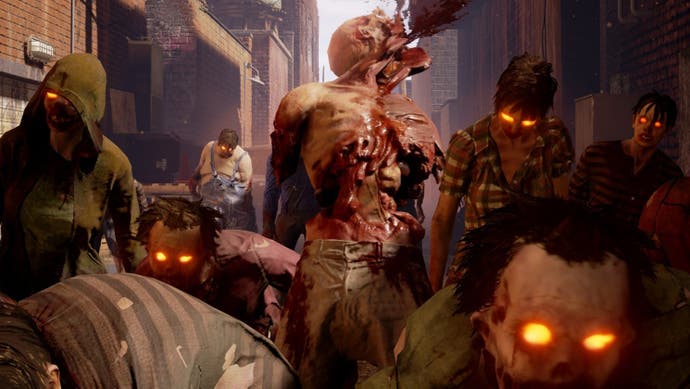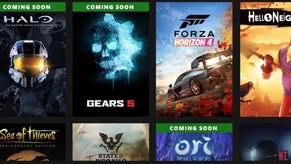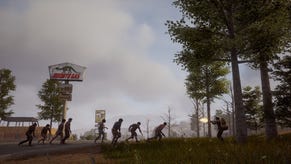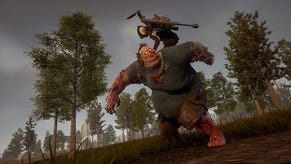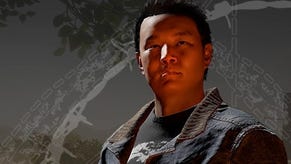State of Decay 2 review - a soggy open-world loot-'em-up with catastrophic bugs
Ghoul me once.
There are times when State of Decay 2 is so buggy that it stops being a stodgy post-apocalyptic looting game and transforms into metatextual horror theatre. At one point during a fight outside a barn, a juggernaut zombie hits me so hard that the UI vanishes, as though punched clean out of my character's skull. I try to speak to another human faction leader later, selecting unseen dialogue options at random, and accidentally trigger a civil war. The game features an extravagant array of injury types, from torn discs to punctured organs, and I half-wonder whether the developer is actually simulating the effects of a head wound through the very interface. How long will it last? Is this some unlockable hardcore option I'm not aware of?
I reload the save and, thank goodness, there's the aiming cursor, but I have other problems to worry about. Doors that seem open won't let me enter. Zombies keep falling out of midair in the distance, as though the Hand of God were literally sowing a wayward planet with the seeds of annihilation. I jump into a car to go clear out a nearby infestation, and the camera develops a Velma Dinkley complex, standing in confusion while I disappear into the sunset. Is the camera, too, falling prey to the zombie curse? Another reloaded save, and now my AI companion has become a ghost - he's visible only on the game's minimap as a teleporting icon who yells in my ear, shaking my nerve far more efficiently than the ghouls that roam the hillsides. I fire up online co-op to escape and, oh crikey, now the audio has caught the gremlins too - I can hear the twangy country soundtrack but when I clobber somebody it sounds like I'm beating a snowman. A plague of silence! Isn't there something in the Bible about that? I quit the session to look it up and, perhaps mercifully, the game crashes.
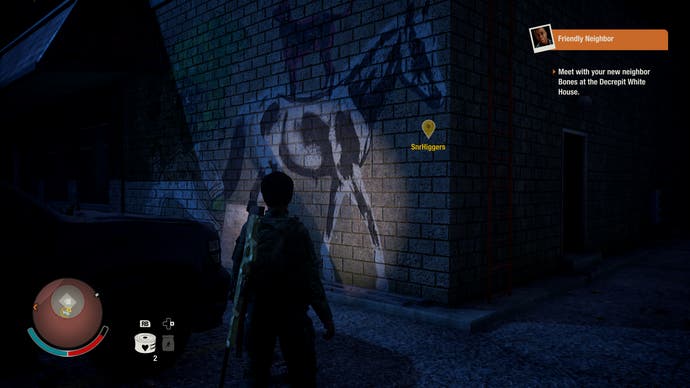
All this on top of more continuous, less dramatic flaws - cars that occasionally jump skyward like startled cats when you nudge anything at greater than walking speed, vicious online latency, lighting glitches and a tendency for characters to get stuck on objects that has obliged the presence of an actual "free rewind" option. There's something almost exhilarating about State of Decay 2's sheer brokenness, the way it limbos under the launch-window bar set by Mass Effect: Andromeda - but alas, sooner or later the clouds part and you're left with the mere tedium of the game within.
Like the 2013 original, State of Decay 2 sees you raising a backwoods community in a zombie-overrun United States, outfitting a homestead with cropfields, guard towers and the like while combing pleasantly ramshackle farms, factories and high streets for resources, weapons and procedurally generated survivors. Each survivor is, in theory, a distinct personality, with an initial level of fitness, firearms expertise and melee capability that levels up automatically, plus a set of vocational skills (e.g. computing) and personality traits (e.g. a penchant for goofing around that cheers people up while lowering productivity). You control them one at a time, switching mostly at will, with the option to enlist another character as escort or pack mule.
As with the first game, the hook here is presiding over a motley gang of uniquely damaged refugees, drawn from all walks of life and prey to all the usual human graces and foibles: real people doing what real people do when shit meets fan. Survivors aren't appealing to the eye - they look like the trackside crowds in Forza and animate like flowerpot men - but they are quite fun to think about, as you sort the good eggs from the liabilities, and try to ensure that each character spends enough time in your hand to acquire decent survival experience.
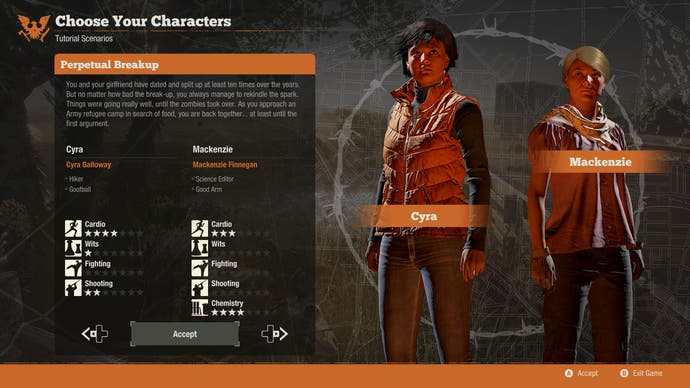
When left at home, characters will heal, recover from fatigue and fend off the odd zombie raid; they'll also broach the odd side mission and raise concerns about base facilities or supplies that feed into an overall community morale level. Should morale sink too low, your survivors may squabble with each other or even up and leave, assuming they don't expire of malnutrition first. It's a setup that takes inspiration from both society simulators like Dwarf Fortress and the sorry cast of The Walking Dead, and there's a lot of detail to chew through, on paper. Among the new features is the option to appoint a leader, which creates an endgame objective - e.g. help every other human group you meet, or become regional warlord - based on that character's worldview.
All of that engrossing specificity is soon forgotten, however, because like so many open worlds, State of Decay 2 is much more about things, property and busywork than it is about people. One key problem is that in practice, you are the world's only moving part. Aside from throwing tantrums and randomly producing the odd consumable item, survivors essentially do nothing when not under your control - they won't even shut the base gate to keep the undead out. Their theoretical quirks and desires are mostly apparent in the aggregate, a question of +1 this and -3 that on the community stats screen. Moreover, their lack of agency means that the core problem of securing vital supplies is down to you around the clock, which means you rarely have leisure to consider each character's nuances, such as they are. Instead, you'll burn through them like rechargeable batteries, scraping together all the loot you can with one before leapfrogging to the next.
The pressure of resource acquisition lessens with time - you can once again turn surrounding buildings into outposts that drip food, meds, fuel, building materials and ammo into your coffers. But by then, you'll also have trained much of the distinctiveness out of your followers, upgrading both the strong and the weak into more or less the same, omni-proficient fighter-scavenger. In this regard, the game falls into a familiar irony for the zombie genre: it reviles the zombies as a brute collective, as mere vengeful matter, while disregarding the way its systems reduce the living to interchangeable objects themselves.

The process of squelching the zeds, meanwhile, feels largely unaltered from 2013. You'll thwack away till your stamina runs out, lob the odd explosive or distraction item and conserve your ammo for nastier threats like the screamers, who loiter to the rear of their groups bawling for back-up. Returning special undead such as pouncing ferals and boss-tier juggernauts aside, you'll now have to worry about plague zombies, whose attacks infect characters and ultimately turn them into zombies themselves. This is a source of trepidation early in the game, but the ingredients for a cure prove easy to come by - just loot dead plague zombies for tissue samples. You'll also find samples inside Plague Hearts, knots of pulsing crimson that randomly populate each map's buildings, where they act as the focus for short-lived wave survival missions. Destroying one of these makes all the others a bit tougher, but your tactics in each case are identical - throw stockpiled explosives at the thing while an ally distracts its zombie entourage, or just toss firecrackers around to amuse the horde while you blast away with an appropriately meaty rifle.
Another new wrinkle is the possibility of conflict with other human survivor enclaves, who occupy their own safehouses around each map and entertain variable views of the player, largely depending on how many oddjobs you've done for them. The game tries to squeeze a bit of drama from your interactions with these groups - some of your own followers will object to you helping them, and no battle between humans is complete without your character tutting at the iniquity of your actions, often while halfway through the act of caving somebody's face in. It's not long, however, before all this is swallowed up in the core loop of scrounging and crafting, and all your smoothskin neighbours become just another set of nagging voices on the radio. Armed with guns and healing items of their own, hostile survivors are more of a threat than most zombies, especially after sunset when the AI's unexplained night vision comes into play - but they're hardly Rainbow Six and, in any case, they don't respawn.
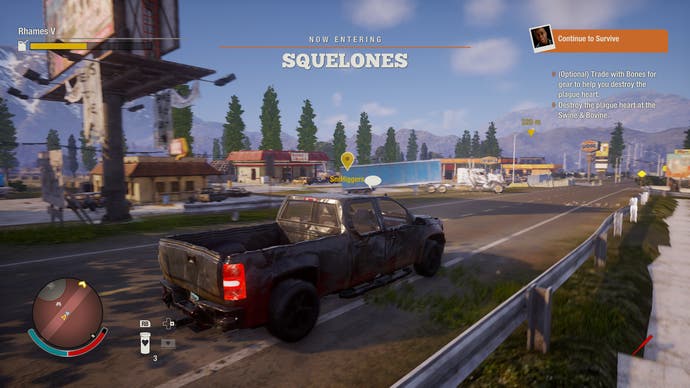
For all its rawness and tedium, State of Decay continues to be a game of occasional sparkle. The maps - there are now three, descending from the mountains to forested valleys - are crude of geometry and beset by streaming problems, but elevated by a rich yet faded, handworn palette. There's a lovely sense of organic disorder to many of the building interiors, with tupperware, shirts and busted tellies strewn all over. It just about sates that quintessentially video game desire to revel in a world's downfall, though you learn to home in on the interactive objects. As in the first title, while searching a structure you have the option of holding a button to speed up, at the risk of dropping something and attracting marauders. It's a nifty risk-reward dynamic, reminiscent of power reloads in Gears, that creates tension when you're in a rush to get home before darkness falls.
None of that's nearly enough to save the game, however, even if you're new to the series. State of Decay 2 is a poor return on the scruffy promise of its predecessor, which topped Xbox Live Arcade charts largely, I suspect, for its resemblance to DayZ. It tantalises with the thought of raggedy everyday heroes pooling their myriad talents to survive, only to quantify and busywork all that out of existence. Its resource and scavenging elements are as suffocating as its social elements are underplayed. It's saying quite a lot that the bugs, in the end, are the things I remember most strongly about it - accidental windows upon an experience that is less sluggish and dreary and, well, less of a zombie.
